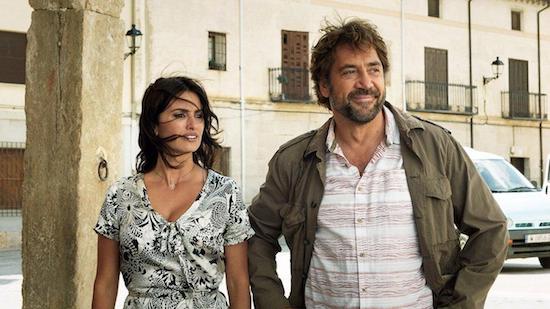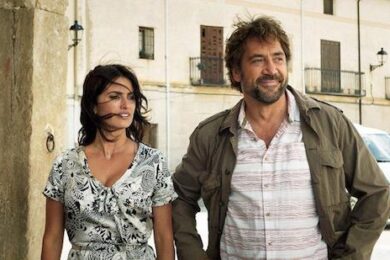There isn’t anything quite as nostalgically romantic as two sets of initials carved roughly alongside a heart into a wall. In Asghar Farhadi’s latest film, the phantom of lost young passion hangs heavily over two lovers whose paths diverged over the years. Everybody knows that Laura and Paco used to be together, much to their pain and sorrow in the present. When Laura’s daughter Irene is kidnapped, the two are forced together again to find some way to bring her back. Exploring familial distrust and resentment, Farhadi digs skeletons out of dusty closets to expose truths that perhaps not everyone had knowledge of.
Opening in a small Spanish village, there is an immediate sense of unease. Penelope Cruz plays Laura, who travels to her childhood home with young son and daughter in tow for the wedding of her niece. Like the beginning of The Deer Hunter, the festivities rage whilst that unsettling feeling endures. Though the alcohol flows freely, something sobering lies just around the corner. The apparently closely knit family feel the blow of Irene’s abduction, but with Laura’s husband Alejandro (played by Ricardo Darin) on his way to the village, Javier Bardem’s Paco bears the brunt of responsibility in his stead.
Farhadi’s background as a filmmaker is in Iranian-set dramas, and though the location may not seem important, it could not be more so. Winning two Oscars for his work, Farhadi creates characters and situations imbued with Iranian customs and life. So for the filmmaker to go so far out of his comfort zone, with a film that lives and dies by its Spanish heritage, seems irregular. Still, Farhadi nails the intricacies of small town and family life, passing off Spanish-isms as if it were his home country. No heed is payed to the style of Spanish filmmakers – no Almodovaran garish colours or melodrama. The reality and social tension familiar to fans of the director’s work is still delightfully, and tragically, present.
Farhadi deliberately distils three unique reactions from the kidnapping, one from each of his central characters. Paco’s is one of pragmatism, with the mindset to have Irene returned by any and all means available to him. Throughout the film, Paco is subjected to the resentment of Laura’s family, because of opinion that he underpaid for the land Laura sold him in their youth. It is easy to empathise with the Spanish land-owner, because of his clear opposition despite an apparent lack of transgressions. He is seen as the protagonist as a result of his characterisation: whether a result of his past and not quite lapsed love for Laura, or just from a heightened sense of duty, Paco’s hero complex sets him apart from a cast of far more passive characters. It is another subtle masterstroke of Farhadi’s to separate this persona from the ever so slightly different Hollywood action man, leaving a pillar of old fashioned masculinity simultaneously revered and shunned. For Bardem, the role is a stretch past the two stereotypes he often seems to fill: the exotic lothario, or the quietly malevolent villain; a challenge Bardem steps up to with relish.
Alejandro’s reaction is somewhat more realistic than Paco’s: knowing that he is unable to raise the ransom money leads him to invest time in the advice of an astute detective. Alejandro concerns himself with trying to solve the mystery, as a course of action alternative to paying the kidnappers. His character is always somewhat less present than Laura and Paco – Farhadi deliberately chooses not to show Alejandro during video calls, so that he is seen for the first time when arriving at the family home. This plays up Alejandro’s quiet intelligence, a feeling that he is desperate to gain control perhaps more than he is to find his daughter. For he has the most to lose: his daughter’s life is at stake, and he knows that Laura’s affections for Paco may not have dissolved entirely. When the situation intensifies, it is disturbingly exciting to see Alejandro change tactics. Darin’s brilliantly tempered performance peaks when he must manipulate Paco to help them find the ransom money, recalling his experiences with God and sacrifice. Throughout, Alejandro’s worry is more grounded than his two counterparts, though there is never any doubt about his total love for Irene.
If there is a hint of manipulation on Laura’s part when she begins to reveal necessary information to Paco, it is too subtle to be appreciated. Instead, Laura is perennially stuck between the two men in her life, rarely afforded significance in the race to save Irene. It is as if the darkest of her emotions take over before any truly bad news arrives – prematurely in grief. Laura is a reactionary character, passive in her own story. As such, Cruz’s acting, though wonderfully realistic, leaves a lot to be desired. Farhadi fails to utilize an actress so incredibly capable, settling instead for an underwritten female perspective.
So much time is spent exploring the actions of the three central characters that other interesting angles fall by the side of the road. Particularly alienating is the treatment of Paco’s long suffering wife, Bea (Barbara Lennie), whose attitude is perhaps worthy of its own film entirely. Farhadi struggles to wrangle such a large cast, made especially obvious in the third act, when the roles of the surrounding family characters become so pivotal. With an ending that relies heavily on these orbital figures, it is confusing how little time is given to them earlier on in the film. If an ensemble mystery piece was the aim of the film, perhaps the sweeping, all-encompassing energy of a film like Gosford Park is what Farhadi should have aimed for. Or, if studying the reactions of the characters was most important, then why give a resolution to the mystery at all? Towards the end of the film, it is apparent how split Farhadi’s focus is, which is a shame for a film with isolated pockets of promise. In the end, the biggest disappointment of Everybody Knows is that it doesn’t really capitalise on its name.
Everybody Knows, directed by Asghar Farhadi, is at UK cinemas now



